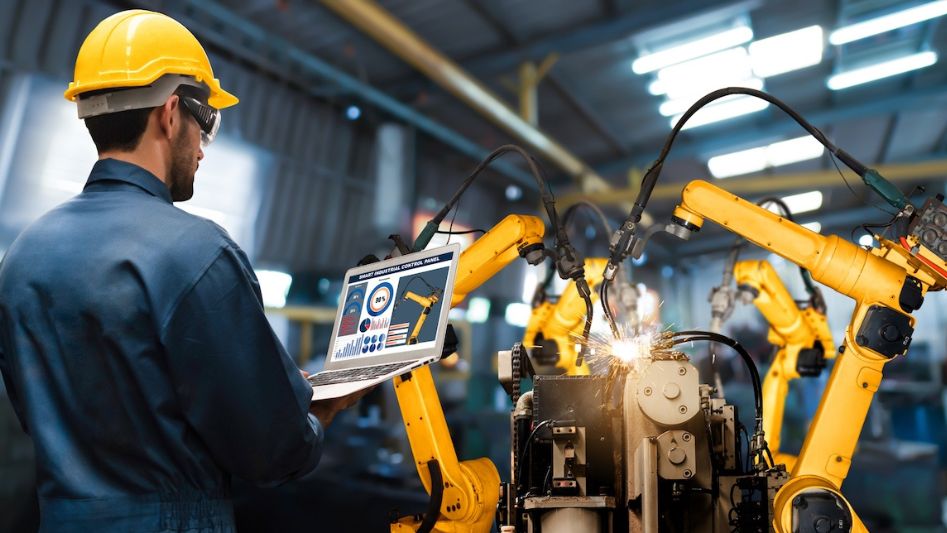Since IoT is a term used for connecting the objects around us to the Internet so that they can be connected and controlled from a single platform.
Most importantly, these devices can provide real-time information to manufacturers and help them manage their products efficiently. Manufacturing is a big process requiring many resources to produce the right products. With IoT, manufacturers can connect their sensors to a central device, which will help them monitor the production process and ensure that the right product is produced.
Also, manufacturing and industrial enterprises have started using the IoT to gather data from their production lines, equipment, and processes. They can now track real-time data, analyze it, and use it for decision-making. The IoT can provide better insights into the manufacturing processes to improve the quality of their products. They also gain competitive advantages by integrating data and analytical tools with their enterprise applications.
So, using IoT in the manufacturing process is going to save a lot of money, and it will also help the manufacturers to make the products in a better way. In this way, companies can save time and money.
Table of Contents:
We invite you to read: “THE TOP 10 IOT APPLICATIONS IN TRANSPORTATION AND LOGISTICS”

IoT Benefits Industries
Let’s now look at IoT’s benefits in the manufacturing industry.
1. Data Collection
Firstly, IoT can collect and store vast amounts of data and information. IoT is an intelligent network of sensors, devices, machines, and people that can be controlled by an application to get information. As a result, the data is stored in the cloud and can be accessed anytime. With the help of IoT, manufacturers can get real-time data to improve the quality of their products.
2. Collaboration
Secondly, IoT can collaborate with other systems, devices, and people. This allows the manufacturer to create new solutions and services that will help to make the manufacturing process more efficient and cost-effective.
3. Data Analytics
Thirdly, with the help of IoT, the data can be analyzed to get insights into the performance of a system. IoT can connect to multiple devices and collect, analyze, and store information about the performance of a system.
4. IoT for Efficiency
Further, the IoT can monitor any physical process, whether a machine, equipment, or the plant itself. It is the ideal tool for monitoring the performance and efficiency of the business. It can also be used to measure productivity, energy consumption, and any other parameters that can be tracked through sensors and devices. These data points help to predict and avoid downtime.
5. Quality Control
Moreover, IoT helps manufacturers to reduce the risk of errors and to enhance quality. When it comes to quality, the manufacturer can check the products based on the production line. It can help the manufacturer to fix the problems as soon as possible, and it can also increase productivity.
We invite you to read: “IOT AND BIG DATA: HOW THE TWO WORK TOGETHER”

6. Better Productivity
Adding to it, IoT can improve product quality and productivity. Companies can easily monitor the operations of their products and can analyze the trends to improve product quality. IoT can improve productivity. IoT can help in monitoring the inventory of the products and can make the process of distribution much simpler.
7. Improved Customer Experience
Further, if you are running a business, you know that it is very important to maintain customer satisfaction. Several tools can help you to improve the customer experience and can increase customer engagement. IoT can also help you to improve the customer experience.
8. Lower Costs
More to it, IoT can lower the overall cost of the manufacturing industry. It can make the product more efficient and also it can reduce the risk of accidents. With IoT, manufacturing companies can track the production of the products and can also make the processes safer.
9. Connectivity
Yet, the IoT is capable of connecting a variety of devices and systems using cloud-based technologies. The sensors can communicate with each other and with the IoT gateway and can also connect to the Internet. It can also connect to the mobile app for the end users and make the job of the workers easier.
We invite you to read: “THE TOP 5 IOT SECURITY THREATS AND HOW TO PROTECT YOUR DEVICES”

Conclusion
In conclusion, IoT is the next-generation technology, and it will change manufacturing and industry in a big way. As IoT is becoming popular day by day, everyone needs to learn about it and utilize its benefits to make their lives easy.
FAQ
What does IoT stand for?
Internet of Things. It is a term used for connecting the objects that are present around us. The most common example of IoT is a smartwatch. The watch can connect to the phone and send notifications.
What are some examples of IoT?
Some examples of IoT are smart homes, smart cities, and smart cars. Smart homes are houses that have devices that can communicate with each other. Smart cities are cities that use IoT to collect information about the environment.
How does IoT help in manufacturing and industry?
IoT helps in manufacturing and industry because it connects all of the objects in our environment. It allows us to monitor and control these objects. Some examples of IoT in manufacturing and industry are smart factories, smart hospitals, and smart cars.
Why is it important to connect things to the Internet?
IoT allows devices to communicate with each other and share information. This allows you to have better control over your processes.
What are the benefits of IoT?
The benefits of IoT are many. It allows us to monitor and manage our products and equipment. It allows us to connect to customers and employees. It allows us to create an environment that is safe and efficient.
You May Also Like
- THE TOP 10 BENEFITS OF IOT IN THE WORKPLACE
- HOW IOT IS REVOLUTIONIZING THE HEALTHCARE INDUSTRY
- IOT MADE SIMPLE: MONITORING TEMPERATURE ANYWHERE
- THE EVOLUTION OF ARTIFICIAL INTELLIGENCE: PAST, PRESENT & FUTURE
- HOW TO CREATE AN IOT SECURITY CAMERA USING ESP32


Recent Comments